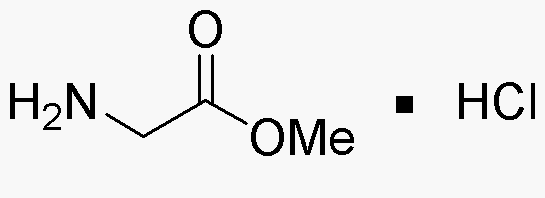Glycine methyl ester hydrochloride is widely utilized in research focused on:
- Pharmaceutical Development: This compound serves as an intermediate in the synthesis of various pharmaceuticals, particularly in the development of drugs targeting the central nervous system.
- Biochemical Research: It is used in the study of amino acid metabolism and protein synthesis, providing insights into cellular functions and disease mechanisms.
- Peptide Synthesis: Glycine methyl ester hydrochloride is a key reagent in the solid-phase peptide synthesis process, enabling the creation of complex peptides for therapeutic applications.
- Food Industry: It finds applications as a flavor enhancer and nutritional supplement, contributing to the formulation of protein-rich food products.
- Cosmetic Formulations: The compound is incorporated into skincare products for its moisturizing properties, enhancing the texture and efficacy of creams and lotions.
General Information
Properties
Safety and Regulations
Applications
Glycine methyl ester hydrochloride is widely utilized in research focused on:
- Pharmaceutical Development: This compound serves as an intermediate in the synthesis of various pharmaceuticals, particularly in the development of drugs targeting the central nervous system.
- Biochemical Research: It is used in the study of amino acid metabolism and protein synthesis, providing insights into cellular functions and disease mechanisms.
- Peptide Synthesis: Glycine methyl ester hydrochloride is a key reagent in the solid-phase peptide synthesis process, enabling the creation of complex peptides for therapeutic applications.
- Food Industry: It finds applications as a flavor enhancer and nutritional supplement, contributing to the formulation of protein-rich food products.
- Cosmetic Formulations: The compound is incorporated into skincare products for its moisturizing properties, enhancing the texture and efficacy of creams and lotions.
Documents
Safety Data Sheets (SDS)
The SDS provides comprehensive safety information on handling, storage, and disposal of the product.
Product Specification (PS)
The PS provides a comprehensive breakdown of the product’s properties, including chemical composition, physical state, purity, and storage requirements. It also details acceptable quality ranges and the product's intended applications.
Certificates of Analysis (COA)
Search for Certificates of Analysis (COA) by entering the products Lot Number. Lot and Batch Numbers can be found on a product’s label following the words ‘Lot’ or ‘Batch’.
Numéro de catalogue
Numéro de lot/série
Certificates Of Origin (COO)
This COO confirms the country where the product was manufactured, and also details the materials and components used in it and whether it is derived from natural, synthetic, or other specific sources. This certificate may be required for customs, trade, and regulatory compliance.
Numéro de catalogue
Numéro de lot/série
Safety Data Sheets (SDS)
The SDS provides comprehensive safety information on handling, storage, and disposal of the product.
DownloadProduct Specification (PS)
The PS provides a comprehensive breakdown of the product’s properties, including chemical composition, physical state, purity, and storage requirements. It also details acceptable quality ranges and the product's intended applications.
DownloadCertificates of Analysis (COA)
Search for Certificates of Analysis (COA) by entering the products Lot Number. Lot and Batch Numbers can be found on a product’s label following the words ‘Lot’ or ‘Batch’.
Numéro de catalogue
Numéro de lot/série
Certificates Of Origin (COO)
This COO confirms the country where the product was manufactured, and also details the materials and components used in it and whether it is derived from natural, synthetic, or other specific sources. This certificate may be required for customs, trade, and regulatory compliance.

